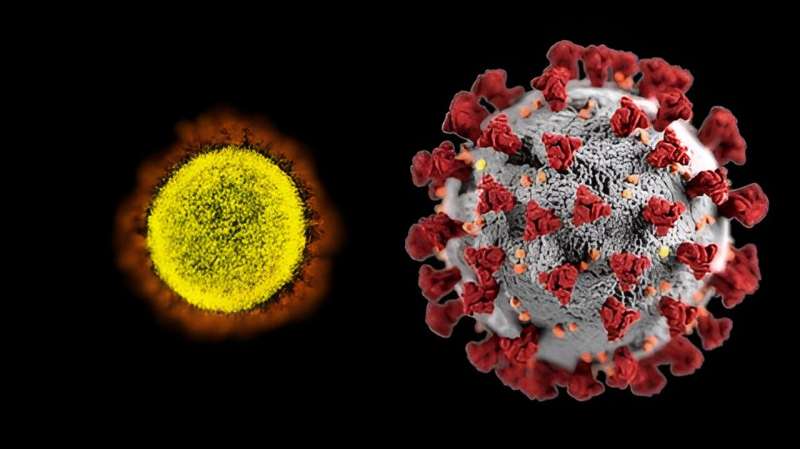This article has been reviewed according to Science X's editorial process and policies. Editors have highlighted the following attributes while ensuring the content's credibility:
fact-checked
peer-reviewed publication
trusted source
proofread
Long-term study reaffirms benefits of COVID-19 vaccination for organ transplant recipients

Findings from a two-year study of nearly 2,400 solid organ transplant recipients, conducted by the Johns Hopkins Transplant Research Center (TRC) in collaboration with the New York University Center for Surgical and Applied Transplant Research, indicate spikes of post-vaccination SARS-CoV-2 viral infections (commonly known as COVID-19 breakthrough cases) remain common, yet hospitalization rates have dramatically dropped following the first wave of the virus' omicron subvariant.
"These results mirrored what medical institutions across the country were reporting for many U.S. populations, not just people who are immunocompromised," says senior study author William Werbel, M.D., Ph.D., assistant professor of medicine and associate director of the TRC's epidemiology and quantitative sciences at the Johns Hopkins University School of Medicine. "It provides more evidence of the value of vaccination against SARS-CoV-2 in high-risk persons, specifically making breakthrough infections less severe and reducing the chance of long-term complications."
The research letter detailing the study was first posted online Aug. 18, 2023, in JAMA Network Open. Werbel calls it "a bit of a capstone" to the study team's national COVID observational research project, which has produced more than 60 published studies since 2021, evaluating the safety, immunogenicity and effectiveness of repeated vaccination in transplant recipients and other immunocompromised people.
"This time, we wanted to look back through two years of data to see how many study participants reported a diagnosis of COVID-19 following vaccination, trending cases over time and by variant era to assess how many of them developed severe disease that required hospitalization," says Werbel. "We also plotted infection trends against reported cases in the general U.S. population to understand the relationship with SARS-CoV-2 circulating in the community."
Werbel says just under a fifth of the study participants (464 of 2,356, or 19.7%) reported SARS-CoV-2 infections, and of those persons, 35 (7.5%) required hospitalization.
"The infection trends paralleled those seen in U.S. COVID-19 case counts, peaking in the first wave of the omicron BA.1 subvariant of SARS-CoV-2 in the winter of 2021, with ongoing prominent spikes during subsequent omicron waves," says Werbel. "Hospitalization rates dropped by 75% in the later omicron era [subvariants BA.2 through BQ.1] versus the rates seen in the earlier subvariant waves [pre-delta, delta and BA.1]."
He explains that the decrease was likely due to many factors, including growing population immunity (from vaccines and exposure to infected people), better disease management (through the use of therapies such as antivirals), more testing and, possibly, changes in the virus itself.
"However, we did find that certain groups—primarily patients who had received lung transplants—remained at higher risk for hospitalization during more contemporary subvariant eras," says Werbel.
Werbel adds that the new study's findings "can guide counseling regarding the benefits of vaccination, and provide an evidence-based framing of risk and risk behaviors for populations most vulnerable to COVID, such as transplant patients."
Next, says Werbel, the TRC will expand the current study's methodology to investigate responses of transplant recipients to vaccines against other infectious threats, such as respiratory syncytial virus (RSV), influenza and mpox (formerly known as monkeypox).
Additionally, he says, the team will continue to study novel strategies to optimize SARS-CoV-2 vaccine effectiveness in transplant recipients through the COVID-19 Protection After Transplant (CPAT) trials. For example, one method is selectively reducing immunosuppressive therapy (used to prevent rejection of the transplanted organ) around the time of vaccination to assess if this permits the immune system to properly respond.
Along with Werbel, the members of the study team are Aura Abedon from Johns Hopkins Medicine, and lead study author Teresa Chiang, Jennifer Alejo, Allan Massie and Dorry Segev from the New York University Grossman School of Medicine.
More information: Teresa Po-Yu Chiang et al, Incident COVID-19 and Hospitalizations by Variant Era Among Vaccinated Solid Organ Transplant Recipients, JAMA Network Open (2023). DOI: 10.1001/jamanetworkopen.2023.29736




















